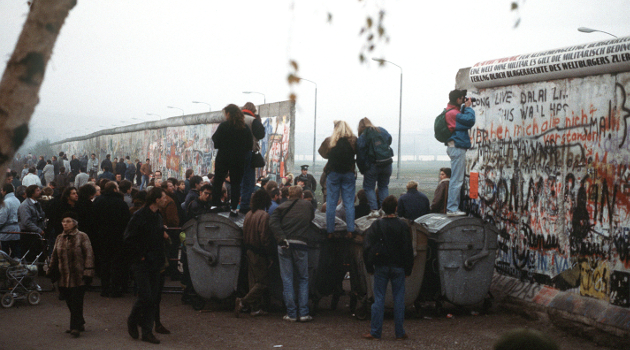In my lifetime, perhaps the greatest moment for human liberty took place 31 years ago when the corrupt socialist dictatorship of East Germany lost the will and ability to maintain the Berlin Wall.
 Almost overnight, there was hope for the long-suffering people of the so-called German Democratic Republic.
Almost overnight, there was hope for the long-suffering people of the so-called German Democratic Republic.
In a spontaneous celebration that still brings tears to my eyes, they joined together with the free people of West Germany to tear down the ugly symbol of Marxist tyranny and oppression.
Even better, the fall of the Berlin Wall was a precursor to the total collapse of the Soviet Empire, thus liberating hundreds of millions of people from the horrific brutality of communism.
But not everybody is happy that the communism wound up on the ash heap of history. In a column for Jacobin, Loren Balhorn wistfully remembers East Germany’s Stalinst regime.
On October 3, 1990, the German Democratic Republic (GDR), formerly one of the most enthusiastic members of the Warsaw Pact, …ceased to exist…the uprisings of 1989–1990 across Eastern Europe saw the consolidation of a neoliberal order as the supposed price to pay for basic civil liberties and nominal freedom of movement. Communist parties that had ruled for decades fell into disarray,
hastily rebranding themselves as social democrats or dissolving entirely. The fall of the Soviet bloc also demoralized large sections of the Left on the other side of the Iron Curtain, prompting the collapse of the international communist movement. …The specter of dictatorship and economic stagnation that is used to (one-sidedly) characterize life in the Eastern Bloc continues to be cited as incontrovertible “proof” that capitalism is the only workable — and indeed desirable — socioeconomic system. Moreover, socialism’s collapse in 1989 demonstrated that, when presented with the choice, most workers opt for the material abundance of capitalism and liberal democracy over whatever a socialist system has to offer. …whatever gains workers had made under socialism evidently were not enough to retain their loyalty when the moment of decision came. …But did it have to be this way?
After posing the rhetorical question whether it had “to be this way?”, Balhorn provides a very twisted answer
For many who survived fascism and wanted a new, better Germany, the GDR appeared as the natural choice. A number of prominent leftist intellectuals and artists, like renowned playwright Bertolt Brecht, composer Hanns Eisler, philosopher Ernst Bloch, and legal theorist Wolfgang Abendroth, opted to move East and lend their services to the cause. …Beyond these famous examples, it should not be forgotten that over five hundred thousand Germans chose to migrate not West but East in the first decade of the GDR’s existence. …The Wall…gave the GDR the chance to build a society that was broadly characterized by modest prosperity and social equality between classes and genders. Workers were guaranteed employment, housing, and all-day childcare, while basic foodstuffs and other goods were heavily subsidized. Though wages were only half of what they were in the West, adjusted for prices in relation to earnings, GDR workers’ actual purchasing power was more or less the same. …class distinctions in the GDR were in fact dramatically reduced, both in material as well as cultural terms.
In other words, Balhorn wants readers to believe that equal levels of misery and deprivation in former communist nations are something to celebrate.
I can’t resist pointing out that his assertion about levels of purchasing power being “more of less the same” in West Germany and East Germany is utter nonsense.
in West Germany and East Germany is utter nonsense.
Here’s the data from a column I wrote last year.
Simply stated, both parts of Germany started out from a very low level after the destruction of World War II.
But then West Germany, triggered by the free-market reforms of leaders such as Ludwig Erhard, became a rich nation while East Germany lagged far behind.
Here’s one final excerpt which must set a record for romanticizing a Marxist dictatorship.
…the women and men who lived and worked in the GDR spent four decades building a society they understood as such and registered a number of remarkable achievements. …we can look to many of its achievements in education, housing, childcare, and labor relations as evidence that society does not have to be organized around the interests of the wealthy and that the free market is not the only way to organize an economy. It is possible to ensure that everyone has a place to live, health care, enough food to eat, and access to education — something that no capitalist society can claim today.
This is – at best – moral blindness.
I noted back in 2017 that there were some economists who used to write about the supposed superior performance of communist nations. But there were merely guilty of naively believing data from communist nations (and also guilty of not actually understanding economics).
I don’t think any of them would be dumb enough to praise East Germany today.
So Loren Balhorn definitely qualifies as a dupe and apologist.
P.S. You won’t be surprised to learn that the nations with the most pro-market reforms are the ones that have most prospered since the collapse of communism.
P.P.S. There’s a grocery store in Texas that played a role in the collapse of the Soviet Union.
———
Image credit: US Dept of Defense | CC by 2.0.

